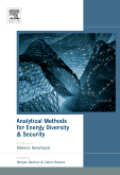
Analytical methods for energy diversity and security: portfolio optimization in the energy sector: a tribute to the work of Dr. Shimon Awerbuch
Bazilian, Morgan
Roques, Fabien A.
Given the uncertain environment in which utilities make their investment decisions, it makes sense to shift electricity planning from its current emphasis on evaluating alternative technologies to evaluating alternative electricity generating portfolios and strategies. The techniques for doing this are rooted in modern finance theory - in particular mean-variance portfolio theory, basedon the pioneering work of Nobel Laureate Harry Markowitz 50 years ago. Portfolio analysis is widely used by financial investors to create low risk, high return portfolios under various economic conditions. In essence, investors have learned that an efficient portfolio takes no unnecessary risk to its expected return. In short, these investors define efficient portfolios as those that maximise the expected return for any given level of risk, while minimising risk for every level of expected return. Portfolio theory is highly suited to the problem of planning and evaluating electricity portfolios and strategies because energy planning is not unlike investing in financial securities where financial portfolios are widely used by investors to manage risk and to maximise performance under a variety of unpredictable outcomes. Similarly, it is importantto conceive of electricity generation not in terms of the cost of a particular technology today, but in terms of its portfolio cost. At any given time, some alternatives in the portfolio may have high costs while others have lower costs, yet over time, an astute combination of alternatives can serve to minimise overall generation cost relative to the risk. In sum, when portfolio theory is applied to electricity generation planning, conventional and renewable alternatives are not evaluated on the basis of their stand-alone cost, but on the basis of their portfolio cost - that is: their contribution to overall portfolio generating cost relative to their contribution to overall portfolio risk. Portfolio-based electricity planning techniques thus suggest ways to develop diversified generating portfolios with known risk levels that are commensurate with their overall electricity generating costs. Simply put, these techniques help identify generating portfolios that can minimise a utility or society's energy price cost and risk. Foreword by Dr. Pachauri, the 2007 winner of the Nobel Prize for Peace: The book will give insights from world authorities in the area of electricity capacity planning, meaning that the book will be a trusted, first point of reference for decision makers in the field. The book evaluates the role of renewables in enhancing energy diversity, giving readers alternative advice to traditional energy sources at a time when this advice is being actively sought. This is an ideal volume for professionals in academia, industry and government interested in the rapidly evolving world of electricity planning and is written by experts from all three areas meaning that readers can relate to the contributors themselves and the situations they describe.
- ISBN: 978-0-08-056887-4
- Editorial: Pergamon
- Encuadernacion: Cartoné
- Páginas: 364
- Fecha Publicación: 01/10/2008
- Nº Volúmenes: 1
- Idioma: Inglés
